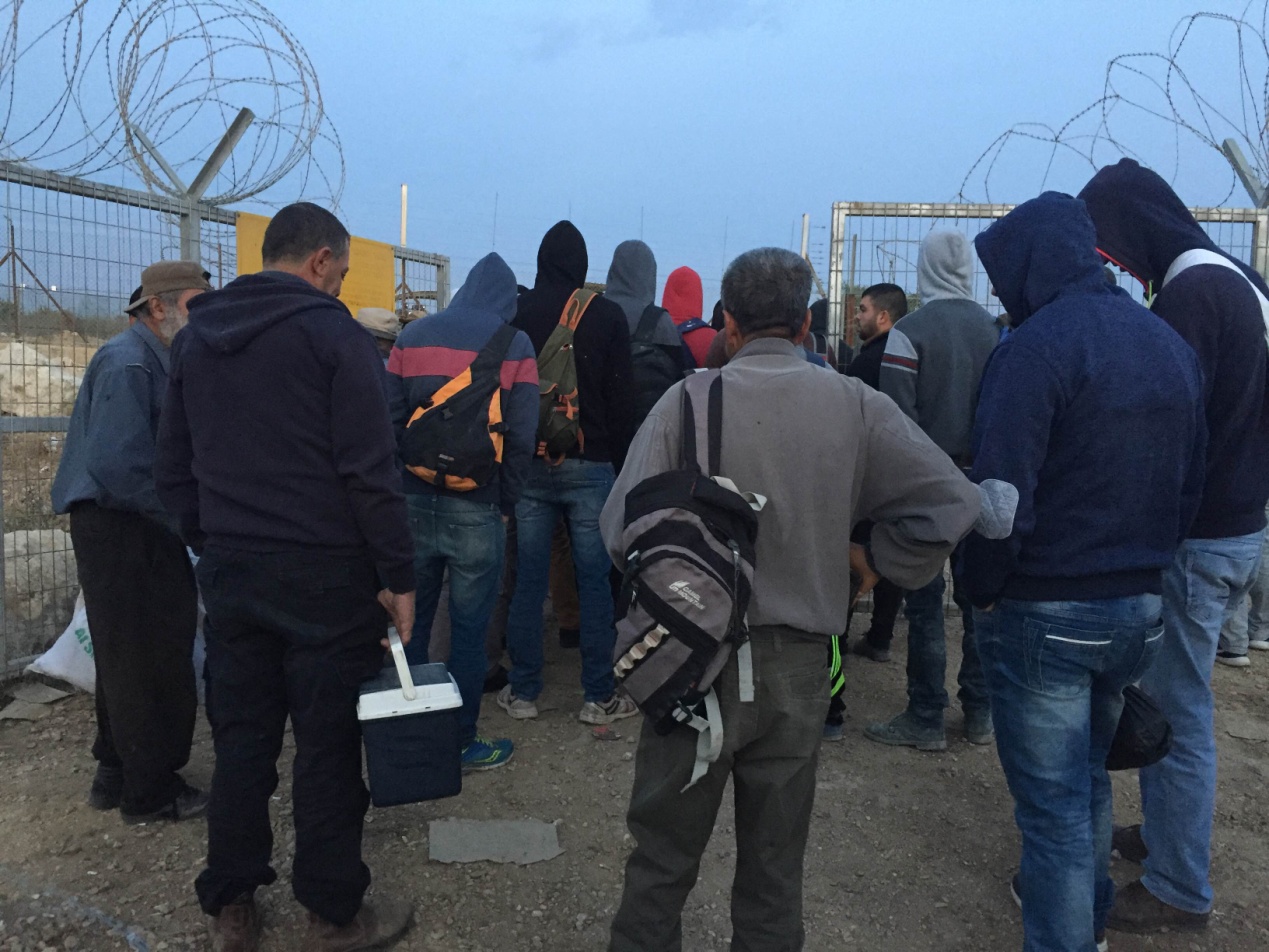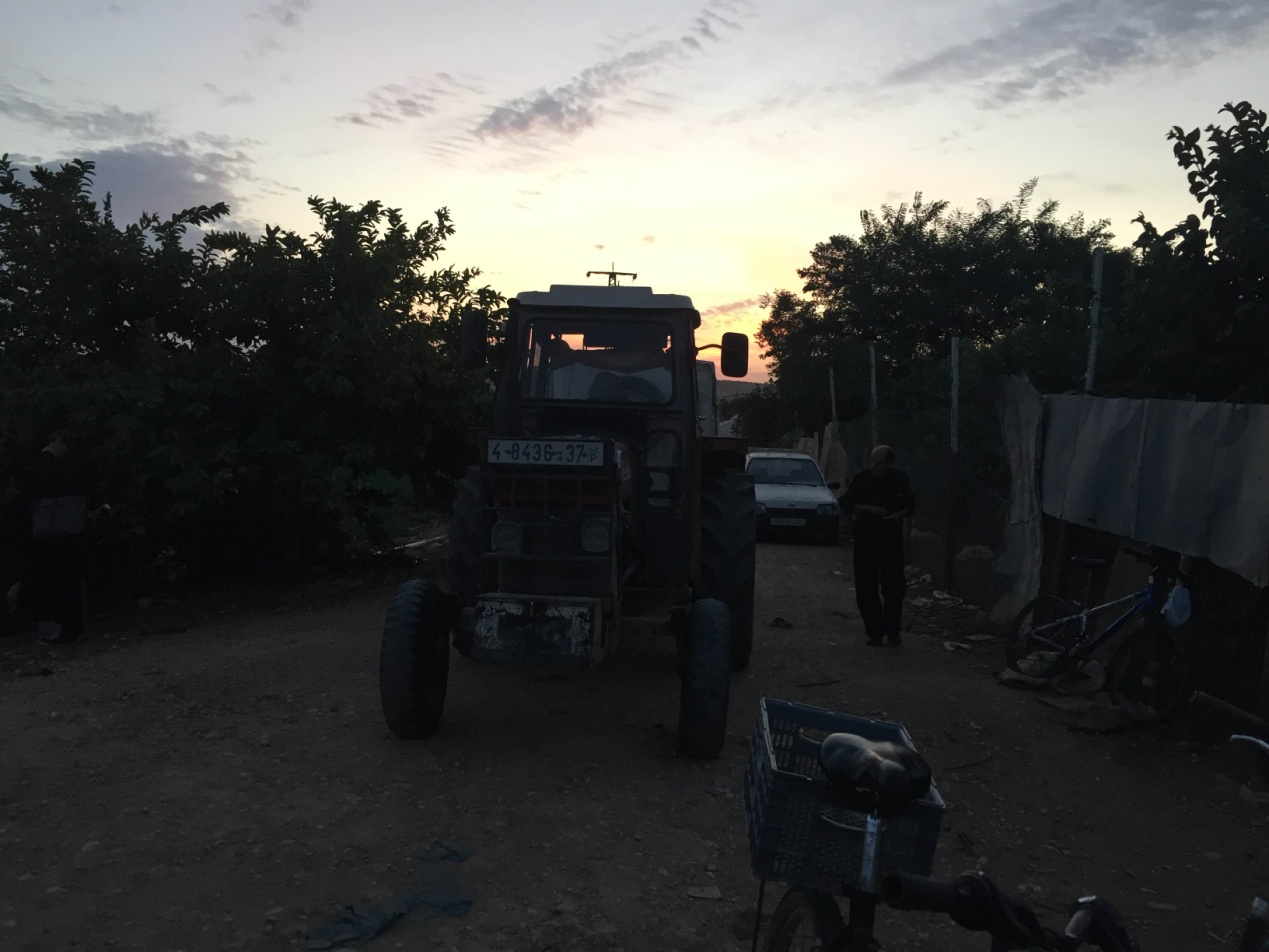'Azzun, Falamiya North Checkpoint (914), Falamiya South Checkpoint (935), Khirbet 'Isla Checkpoint) 1231
When we arrived at Falamya north at 06:15 it was still dark and cold and everyone waited at the gate. We were greeted with smiles from old acquaintances, some asked “Why don’t you come every day? There’s no point to your coming only at long intervals.”
They’re right!!!
We asked why. “Sometimes there are good soldiers and then everything works well, sometimes there are bad soldiers and then nothing works.” An example of a bad soldier was the blond female soldier at the gate who was wearing a large conical cap. She didn’t harass them today. It seems everyone has gotten used to the fact that in order to reach your land you’re at the mercy of the soldiers’ good will.

During the quarter-hour we waited for the gate to open H. told us what he remembers of the ’67 war: he was 4 years old and his parents, grandparents and uncles and the entire family fled the village, they’d remembered what had happened in ’48 and in ’56 in Qalqilya (the reprisal attack) and feared the Israeli soldiers. They crossed the Jordan and lived in tents for a few months. Later they decided to return, but did so carefully and the Israeli army didn’t notice them. They returned to their homes in Falamya and continued working their land. They have 100 dunums, but most of it is now beyond the fence.
“Do you talk about the nakba?” “No, we’re busy trying to survive, obtain food for the children (he has five children, all students, at Najah University, in Hebron and in Tulkarm). He needs money for the children’s schooling, he has no time to think about the past. We think about the present. And at present it’s not raining and we must irrigate the za’atar fields.”
“How do you irrigate them?”
“We’re lucky to have our own wells, since before ’67, so we have water and we pipe it to the fields; the pipes are also from then. But today Israel doesn’t allow us to dig more wells. If someone sinks a well to find water the army blocks it up. They say all the water belongs to Mekorot. But that’s not true; it’s water that’s below our village…
“How do you make a living from za’atar?”
“Once all the area you see before you, long before the fence was erected, all this was citrus groves. But now there’s no money in oranges, so we uprooted them and planted za’atar. We export za’atar to Jordan and from there to the Gulf states. At first we earned a lot of money from za’atar but now that everyone grows it we make less, and the Jordanian middlemen, those who buy from us and sell to others, earn the most, not the farmers. The conversation flows and is very interesting, and I say to myself, only early in the morning, talking to people before the gate opens, can you learn a lot about their daily lives, their problems, about all of our missed opportunities – ours, we who aren’t afraid to come and talk to the Palestinians – and of the mass of Israeli citizens who have learned only to fear. And I’m glad that my friends and I have these human experiences early on a cold, dark morning.
The gate opens, people on foot go through first, in groups of five (the blonde’s orders), including A., our acquaintance. H. gets on his bicycle, Z. on his donkey, A. is on foot and “Dear Adnan” drives his car. About 12 tractors go through, everyone smiles and waves hello to us, “Come again tomorrow.”

We hurry along the fence to meet the blond soldier and her other soldiers at the Jayyus north gate where there are only four tractors on which some women we recognize are riding. To reach the Jayous south gate we must drive toward Jayous, pass the municipal building, the taxi stand, take care not to run over children on their way to school. We wait at that gate – there is no one waiting and no soldiers.
We cross the wadi on a fairly new gravel road connecting Jayyus and Nabi Ilyas, a significant shortcut. It’s hard to cross the main road at Nabi Ilyas; it’s already 07:30 and endless lines of hundreds of settlers’ vehicles are traveling to jobs in the Sharon area and the center of the country.
With Rachel’s daring maneuvers behind the wheel we hurry to the Khirbet ‘Isla gate and arrive before the soldiers. A few people are waiting, 6 people and 8 donkeys who don’t cease braying and complaining about the situation. Our acquaintance Abd’el R. also arrived, though we won’t go into detail here about his exploits…
From Khirbet ‘Isla we drove to visit our friend in ‘Azzun.
His surgery was almost two weeks ago and this coming Wednesday we’ll accompany him to the final stage of the surgery, following which Z. will once again be as well as everyone else. God willing!
